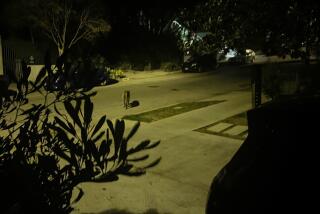Standing strong against coyotes
Three yipping Pomeranian dogs at her feet, Renee Merrill grabs a 7-iron and steps into her backyard, ready for battle.
A year ago, she had a fourth Pomeranian, a tiny fluff of brown and white fur named Zeus. But as Merrill attended to business inside her home, a coyote hopped her 6-foot fence and dragged Zeus off. Her sobbing children later found his battered body.
“This was at 9:15 in the morning,” Merrill said. “I’ve lived here 19 years and it never crossed my mind that coyotes would attack in broad daylight.”
That realization has changed Merrill’s life in a major way. Today, the 53-year-old single mother is waging a personal crusade to warn her neighbors in the Newbury Park area of Thousand Oaks about the shaggy predators’ increasingly aggressive behavior.
Coyotes’ growing boldness, experts say, is fueled by human complacency, and Merrill is determined to change her neighbors’ behavior.
She’s posted signs warning of daytime attacks. She’s educated herself about the best ways to keep coyotes from coming around. She stockpiles articles about coyote behavior, coyote trapping methods and anti-coyote fencing, forwarding them to people who ask for help.
She even plans to form a wildlife watch program — similar to the crime-preventing Neighborhood Watch — and wage her campaign block by block.
The petite brunette admits it’s an odd avocation for someone who devotes much of her free time to rescuing shelter dogs and cats, but she says the problem cannot be ignored.
Coyote sightings in Southern California’s hillside neighborhoods have become commonplace, as the animals are drawn by the promise of an easy meal, said Kevin Brennan, a wildlife biologist with the state Fish and Game Department.
They go for garbage, pet food in outdoor bowls and fruit dropped from trees. If they get comfortable and the opportunity arises, they will attack small pets too, Brennan said. The problem arises when people become so used to having coyotes around that they make no effort to scare them away, he said.
Across the state, people are increasingly reporting coyotes staring them down or snatching small dogs from yards right in front of them, Brennan said.
His advice: Never let a coyote become comfortable around homes.
“If coyotes are behaving boldly during the day, you’ve already lost the battle,” he said. “If that happens, you’re beyond the point where nonlethal measures will be effective.”
After Zeus’ death, Merrill carried a golf club every time she took her dogs out for a few minutes’ romp in the backyard. She installed rollers — horizontal plastic tubes that spin freely —- on her fence to make it difficult for coyotes to scale the barriers, and she carries an empty soda can filled with small batteries to make noise.
Other hazing techniques she recommends include spraying them with a garden hose, raising your arms and shouting loudly or shooting them with a paintball gun. It’s illegal to shoot the animals with an actual firearm within the city limits.
On a recent walk, Merrill pointed out the homes of pet owners who had also experienced coyote attacks. One neighbor lost a dachshund, another a sheltie.
Malisa Auster, who lives a couple of streets away from Merrill, said that she had just let her dachshund mix into her yard in August when a coyote jumped over a low wall and dragged him down the cul-de-sac. Coyotes still cruise by on the hillside above her house almost every day, she said. She recently snapped a photo of one that stood staring her down in her backyard.
“I don’t let my dogs out at all unless I’m with them,” she said. “I sit on the wall and watch.”
Sylvia Prentis, who has lived in the neighborhood 46 years, said the animals have definitely grown more aggressive. “They are walking down the street in broad daylight,” she said. “Our lives have changed and we have to do something about it.”
Greg Smith, a Thousand Oaks environmental planner, said the city doesn’t take action unless a coyote threatens or attacks a human, and that hasn’t happened. If it did, the city would hire a trapper to find the animal and euthanize it, he said.
He commends Merrill’s efforts to educate residents about how to keep their domesticated pets safe.
“Some people actually feed them,” Smith said. “We have to change behaviors to keep them away.”
Merrill said she and other neighbors have considering hiring a trapper. But the cost, about $3,000, has held them back, she said.
For now, she keeps posting brightly colored signs. She’s received a lot of calls thanking her for her work, but Merrill says that she still sees cats and small dogs wandering unattended during the day.
She keeps a small picture of Zeus on a laminated pendant on a chain around her neck to remind her why she shouldn’t drop her mission, Merrill said.
“My goal is to keep cats and dogs inside during the day,” she said, “It’s the only solution to keep them alive.”
catherine.saillant@latimes.com
More to Read
Sign up for Essential California
The most important California stories and recommendations in your inbox every morning.
You may occasionally receive promotional content from the Los Angeles Times.











